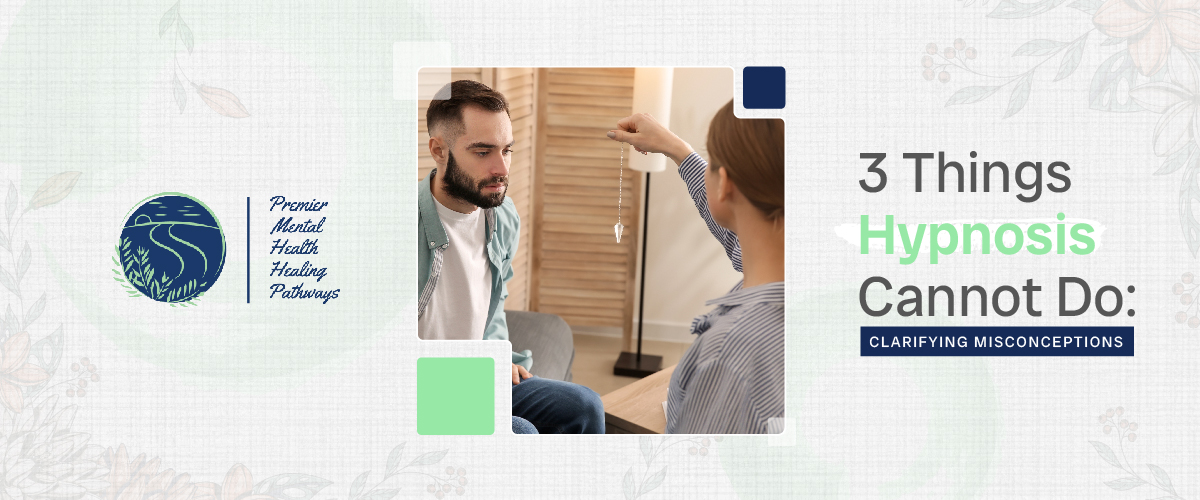People have been curious about hypnosis for a long time because it is often used in dramas, movies, and TV shows as a mysterious and powerful tool.
However, many misconceptions have been raised, which makes people have unrealistic expectations about how well it works.
Although hypnosis can help people with behavioral and physical issues, it is required to identify how it works and clear all misconceptions.
At Premier Mental Health Healing Pathways, hypnosis techniques can be highly beneficial. Done by a trained expert, it helps a lot with personal change and healing.
3 Things Hypnosis Cannot Do: Clarifying Misconceptions
Misconception 1: Hypnosis Can Make You Do Things Against Your Will
A common misbelief about hypnosis is that it makes people do things they don’t want to or shouldn’t. Films and shows often feed this error, showing hypnotists making people behave silly, like performing funny things.
But the truth differs greatly. With therapy hypnosis, it’s a team task involving the hypnotist and the person.
Here, the individual holds all control and can snap out of hypnosis anytime. Hypnosis helps reach the subconscious mind but doesn’t bypass their right to choose.
For instance, if a hypnotist proposes committing a crime, the person would deny it flatly if it’s against their ethics.
Example: Imagine a person looking to quit smoking using hypnosis. What the hypnotist does is lead them into a calm state. They then make positive suggestions. For instance, they could link smoking to bad emotions. These ideas can have strong effects, yet they only impact if the person truly longs to stop smoking. Without that desire, just hypnosis won’t push them to quit.
Misconception 2: Hypnosis Can Cure Physical Illnesses
Many people think hypnosis can fix physical illnesses like cancer, diabetes, and constant pain.
Truth is, while hypnosis aids in some symptom control and can boost overall health, it isn’t a fix-all for medical issues. Hypnosis can lower stress, helping those with physical problems feel better.
But, it can’t treat the root health problem itself. Depending only on hypnosis for physical health could mean overlooking important medical treatment. This could make the condition worse.
Example: Imagine someone with long-term pain. Hypnosis could help them. It promotes relaxation and lessens stress. This might boost their life’s quality. But, it doesn’t fix the main cause of the pain. An underlying health problem needs proper diagnosis and treatment by medical professionals. Hypnosis can be just one part of a holistic plan. But it shouldn’t be the only solution replacing medical treatments.
Misconception 3: Hypnosis Provides Instant and Permanent Solutions
Many people believe that hypnosis can offer immediate and permanent solutions to their problems, whether it’s weight loss, addiction, or anxiety. Hypnosis can help, but it’s neither immediate nor permanent.
It works best as part of a comprehensive treatment plan. It instills people with a calm and focused state of mind. This makes them more open to good advice and changes in behavior.
Yet, change that stays usually means more than one session and work from the person. Hypnosis can give a boost but should work with other types of therapy and lifestyle changes.
Example: Imagine a person dealing with lingering, heavy anxiety. Hypnosis might offer a respite. It eases them into a deep, calming relaxation, cutting off stress. But, for the long haul? Managing anxiety needs more. Think cognitive-behavioral therapy, also known as CBT. Regular physical activity. Practices rooted in mindfulness. Hypnosis aids these techniques, yet by itself, it can’t completely cure.
What Does It Feel Like to Be Hypnotized?
Hypnotic healing, or hypnosis is like getting lost in a daydream or a riveting book. This stress relief hypnotherapy calms you down, making you feel comfortable and somewhat removed from your environment.
You’re fully aware though. It might make your body feel really heavy or incredibly light. Your mind becomes crystal clear, helping you zero in on certain ideas or counseling.
Contrary to belief, you’re in charge and can snap out of the hypnosis anytime. This mix of relaxation and intense focus makes hypnosis a therapy tool.
In Conclusion
Hypnosis is helpful, but it has limits.
The 3 things hypnosis cannot do is:
- It can’t force you to act against your will.
- It can’t cure physical sickness.
- It can’t give quick, lasting fixes.
Clearing up these myths helps us see reality.
Hypnosis serves as a valuable tool for enhancing mental well-being and personal growth. Knowing its strengths and weaknesses lets us use it better.
Are you thinking about hypnotherapy services for improvement or simply just to learn? It’s key to have the right view of it.
FAQs
What doesn’t hypnosis help with?
Hypnosis isn’t the answer for severe diseases like cancer or deadly conditions. While it can boost your overall health and aid with pain management, weight loss, and quitting smoking, it’s not a substitute for proper medical attention. Furthermore, hypnosis can’t make anyone do something they are against or something that contradicts their core beliefs.
What bad things can happen when you’re hypnotized?
Generally, experts consider hypnosis safe if performed by trained professionals. In a few unique instances, some people might feel unease, headaches, or dizziness. Hence, it’s always recommended to seek experienced professionals for a smooth hypnotherapy.
How long can someone be hypnotized?
Typically, this form of relaxation lasts between half an hour to an hour. There’s no evidence suggesting perpetual hypnosis. The hypnotist guides the process and ensures the person under hypnosis wakes up normally.
Why doesn’t hypnosis work?
If the person is skeptical or not ready to be hypnotized, it might not be successful. Friction with the hypnotist, incorrect hypnosis methods, or external disturbances could affect its efficiency. Cooperation and readiness from the person are key for hypnosis to work.
Is hypnotherapy covered by insurance?
Insurance plans differ in hypnotherapy coverage. Typically, if it’s medically needed, like for a known condition, some private insurance may cover it. But, not all cover it, and Medicare usually doesn’t. For your coverage details, it’s good to ask your insurance provider.





No comment